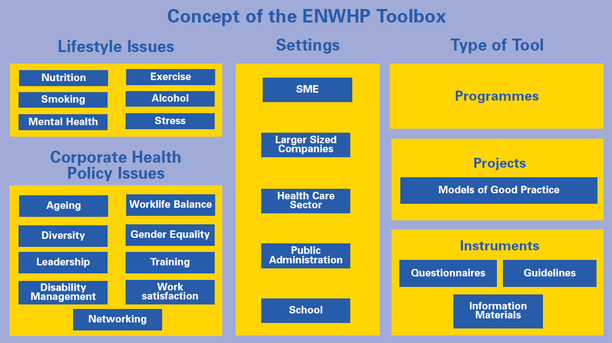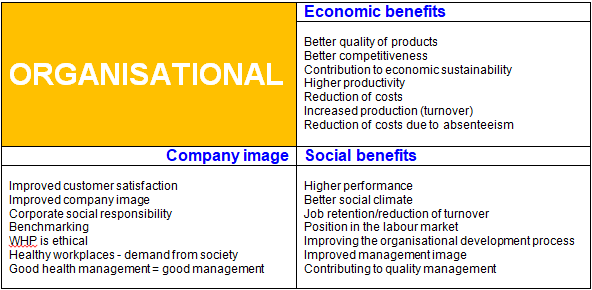The Implementation of Infrastructures for Promoting Workplace Health
4th Initiative (2002 - 2004)
This initiative supported the national development of WHP through stakeholder forums, a toolbox of WHP tools and arguments to make the case for WHP. 22 European countries took part in the initiative.
Objectives
| To develop supportive WHP infrastructures by initiating national forums for WHP (National Forums) |
| To improve the methodological knowledge base for WHP by developing a European WHP "toolbox" |
| To develop a collection of arguments which justify investments in WHP (Case for Investments in WHP) |
Description/Methodology
Reports from the National Contact Offices (NCOs) indicated that there were both opportunities for development and significant barriers to the next phase of development of WHP in Europe.
National policy holders were generally supportive of WHP, but had difficulties in disseminating and persuading employers to initiate WHP. Though the reasons for slow uptake vary between countries, a number of common problems emerged that were to be addressed by this Initiative.
Firstly, many NCOs had not got well developed contacts with potentially interested employers and other stakeholders. The first sub project ‘National Forums’ addressed this issue.
Secondly, Employers and others involved in implementing WHP did not necessarily have a strong methodological base to support them in doing so – the second sub-project (Toolbox) addressed this problem by collecting tools that support the implementation process.
Thirdly, a more general problem was identified in terms of marketing the concept of WHP to all stakeholders, but employers and workers in particular. The third sub-project addressed this problem by developing a case for undertaking WHP (this is framed not only in terms of financial benefits) that can be used to convince people to become involved in WHP.
The methods used in each of these projects varied considerably.
For the national forums, the NCOs identified the main stakeholders in their country and invited them to take part in meetings whose functions were to establish a communications network for dissemination of information on WHP.
For the Toolbox, the second project relied on two strategies – literature reviewing (particularly European literature reviewing) and on the nomination of tools known to be effective by NCOs.
For the business case, the third project used literature reviewing as its main source of information.
The Initiative concluded with a conference held in Dublin during the Irish EU Presidency.
Main findings
The Toolbox contains a range of tools that have been organised according to the following schema:

The case for WHP has been separated into issues that can be used to convince employers and individuals. These issues have been framed in terms of the benefits that may accrue to the individual or the employer. These benefits can be either direct (e.g. in terms of health benefits) or indirect (e.g. in terms of their impact on other workplace outcomes and processes).These arguments have been organised in terms of the following schema:


Outputs
TOOLS
The ENWHP-Toolbox: a compilation of programmes, projects and instruments across different settings and health topics collected from European Countries.
Report (PDF 0,9 MB); Short Version (PDF 0,8 MB)
REPORTS
The Case of WHP: a detailed analysis of the private sector company case for investing in WHP (Business Case) based on an extensive literature review.
Report (PDF 0,3 MB); Short Version (PDF 0,2 MB)
National Forums/Networks: The installation of national forums/networks for WHP, which involve both institutional stakeholders and direct users like private sector companies, in so far 19 member countries.
Report (PDF 1,6 MB)
PROCEEDINGS
Dublin Conference: The 4th initiative was concluded by the 4th European Conference of the network, hosted by the Irish Ministry of Health and Children during the Irish EU Presidency term and jointly organised with the European Commission / DG Sanco (June 2004).
Documentation of the speeches and presentation given at the Conference in Dublin
Countries involved
Austria, Belgium, Bulgaria, Czech Republic, Denmark, Finland, France, Germany, Greece, Hungary, Iceland, Ireland, Italy, Luxembourg, the Netherlands, Norway, Poland, Portugal, Romania, Spain, Sweden, Switzerland, United Kingdom.